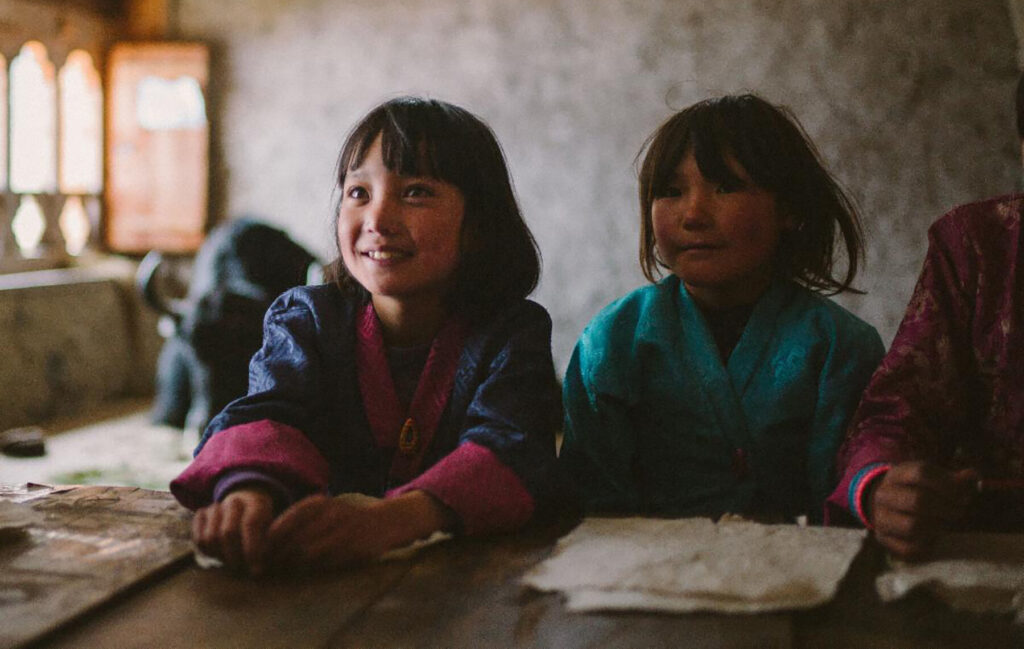By Jana Monji, AsAmNews Arts & Culture Reporter
Being shortlisted for an Academy Award was “surreal,” but on the morning of February 8, 2022, when the nominations were announced, Pawo Choyning Dorji (དཔའ་བོ་ཆོས་དབྱིངས་རྡོ་རྗི།) recalled he wasn’t even sure he was nominated. “I even thought when they announced it, the two hosts (Tracee Ellis Ross and Leslie Jordan) were having a comical moment.”
After all, it wasn’t so long ago that a confused Warren Beatty and Faye Dunaway announced the wrong Best Picture winner. Dorji, the writer and director of Bhutan’s first Oscar-nominated film Lunana: A Yak in the Classroom, remembered that 2017 fiasco when La La Land was announced instead of the actual winner, Moonlight.
Speaking with Dorji, one is instantly charmed by his modesty and his smile. When asked how many languages he speaks, Dorji said that besides English, “In Bhutan we have many different dialects for a small country. I speak four of that. I speak Tibetan. I speak a little bit of Hindi.” Then he admitted with a chuckle, “And basic Chinese, you could say, because my wife is Taiwanese.” His wife, Fanyun “Stephanie” Lai, is an actress and producer who also happens to be the daughter of American-born playwright Stan Lai. The couple splits their time between Taiwan, Bhutan, and India and have two kids.
People who know of the country generally have positive feelings. “Bhutan around the world is known as the ‘happy country,'” Dorji explained. “Usually when I introduce myself to someone, I say. ‘I’m Bhutanese.’ The next thing question will always be: “You must be very happy.”
LATEST STORIES
That can prevent people from seeing the reality of Bhutan today. Dorji explained, “It’s nice to be known as the happy country, but then the fact of the reality is Bhutan is a third-world country. We have limited resources. Because of that, there are real problems. We have thousands and thousands of people leaving Bhutan, especially the youth in search of, ironically, happiness elsewhere. The second thing is we have hundreds of teachers who have become disillusioned with their jobs, what they’re trying to do. Hundreds of teachers, they are quitting their jobs.”
Dorji is not the typical Bhutanese because his father was a diplomat and he was born in India. He also lived at a young age in Europe and the Middle East as well as the United States before going back to Bhutan with a different perspective having seen the outside world.
“When you look into Bhutan, you will realize the teacher category is losing the most number of people, quitting every year.” And that’s the reason, Dorji made this film. “Lunana: A Yak in the Classroom is really a reflection of what I see happening in Bhutan right now. I feel that filmmakers, but on top of that even artists and storytellers, we have a very important responsibility. I think our creations, the stories that we tell, should and must reflect the world that we live in right now.”
While the film itself is fiction, Dorji explained it is based on true stories shared with him by real-life teachers. It’s a story he’s wanted to make for a while. Even the title of the film came from a story told to him by a teacher.
“I met a teacher and I realized he had worked in the highlands so I asked him how was it living in the highlands. He said, ‘It was so difficult because there are no trees for wood to make fire with so I had to climb mountains to collect yak dung. So finally I got so tired I tied a yak in the classroom.’ I was like, wow! A yak in the classroom! How amazing that would be visually to capture. Elements like that.”

Dorji was a photographer before he was a filmmaker. Starting when he lived in India, he was heavily influenced by Raghunath Rai Chowdhry, known as R,aghu Rai. Rai (December 18, 1942) is an Indian photographer and photojournalist who was a protégé of Henri Cartier-Bresson (1908-2004). Dorji came to filmmaking through the Tibetan/Bhutanese lama (and filmmaker) Khyentse Norbu (born 18 June 1961)
You can clearly see Dorji’s vision and photographer’s eye in Lunana. “I worked very closely with the cinematographer Jigme Tenzing,” Dorji recalled. “The two of us, we had a very clear picture of how we wanted to shoot this movie. I don’t like cameras that move a lot. I don’t like cameras that follow the characters. I like the camera to be still static. I like the story to open up and develop organically. If you notice in the movie, most of the scenes are static. We had this plan: We wanted to audience to really feel what the protagonist was feeling.”

The entire film was shot with one camera. In Lunana, there was no electricity, so they used solar power. Without electricity that meant the lighting relied heavily on bouncing and fills.
This week, Dorji is more likely wondering how a guy with one camera, no major studio behind him and up until recently, without an agent, made it into the Oscars, attending functions with Denzel Washington, Jessica Chastain and Steven Spielberg. He’s a man representing a country that hadn’t submitted a film in over two decades and that resulted in a scramble that delayed his official submission by a year. “You could say it is a story of perseverance.” With this momentous and amazing debut, one can only hope that Dorji continues to tell stories. Quoting Buddha, Dorji said, “We create illusions to show people the truth.” And in Lunana: A Yak in the Classroom, he has shown the world the majestic truth of his happy country and even a possible path to happiness.
The 94th Academy Awards ceremony will be held at the Dolby Theatre in Hollywood, Los Angeles, on 27 March 2022. Lunana: A Yak in the Classroom is up against Japan’s Drive My Car, Denmark’s Flee, Italy’s “he Hand of God and Norway’s The Worst Person in the World. Lunana: A Yak in the Classroom is currently streaming on YouTube, Apple TV, Vudu, and Amazon Prime Video.
AsAmNews has Asian America in its heart. We’re an all-volunteer effort of dedicated staff and interns. Check out our new Instagram account. Go to our Twitter feed and Facebook page for more content. Please consider interning, joining our staff, or submitting a story, or making a contribution.








